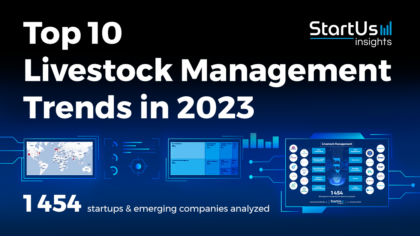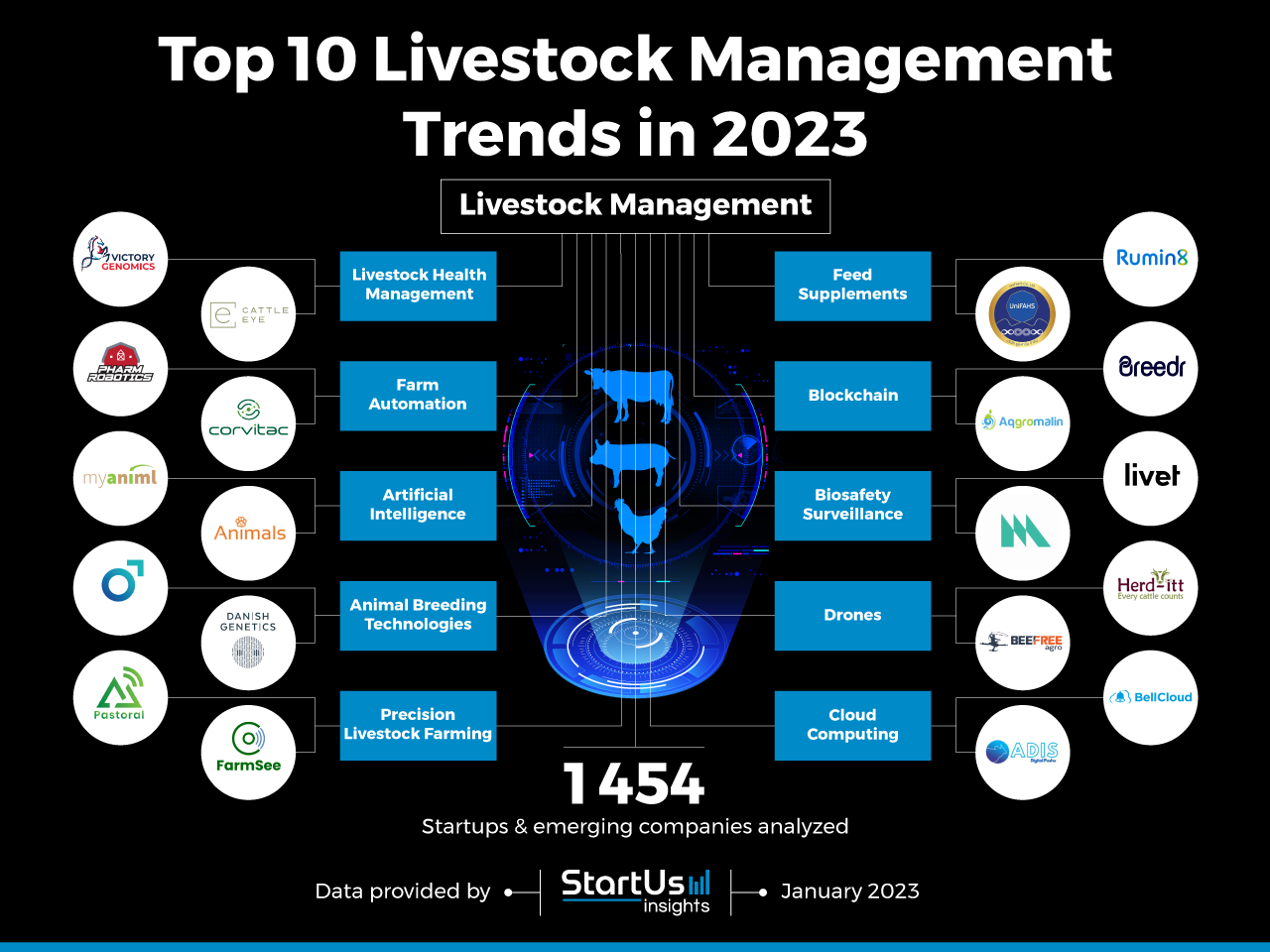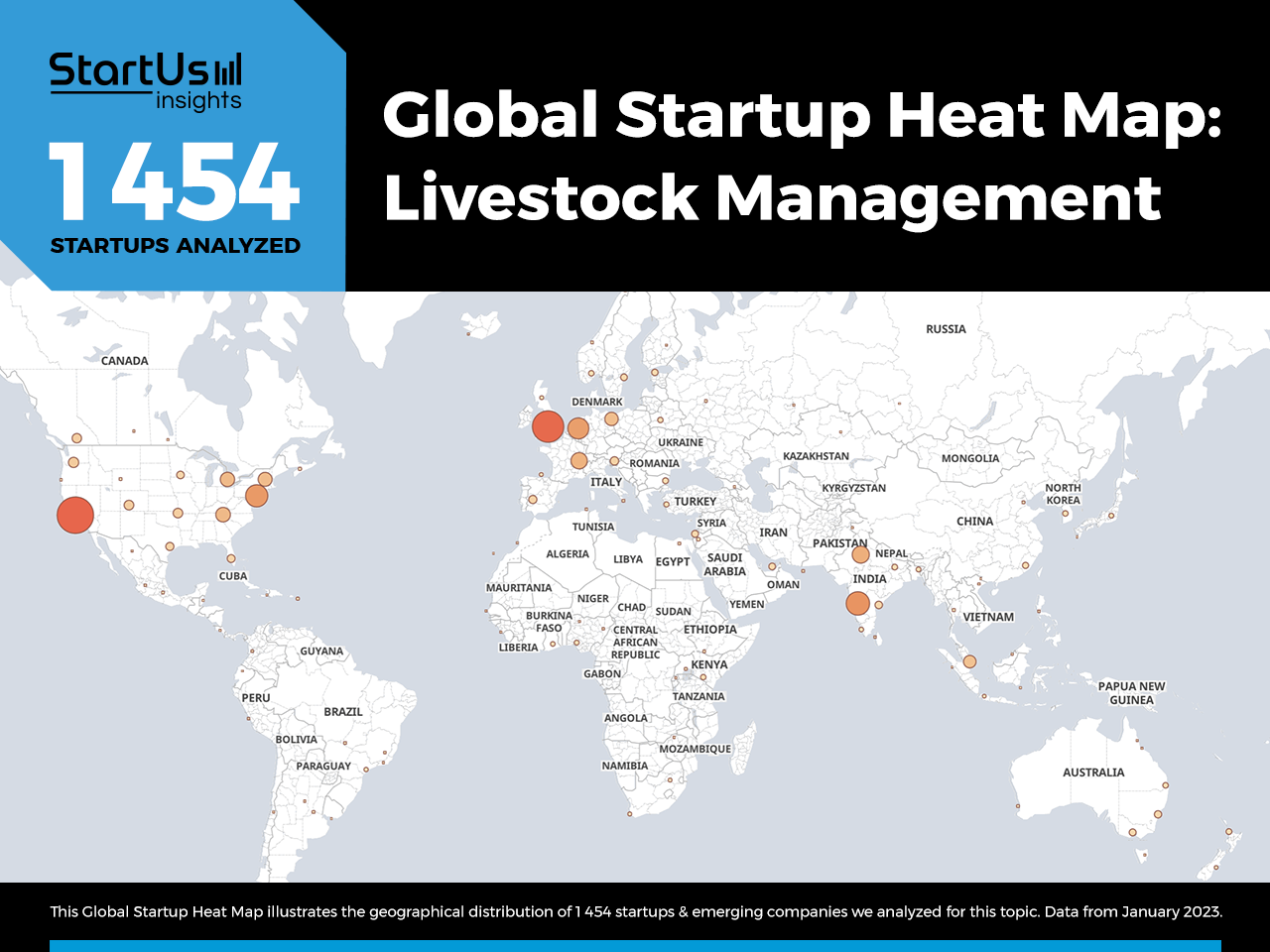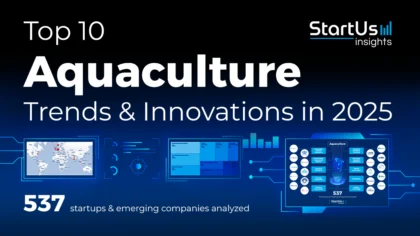Accelerate Productivity in 2025
Reignite Growth Despite the Global Slowdown
Technological advances in livestock management improve global food security and sustainability as well as animal welfare. For example, farm automation solutions use sensors and robotics to automate livestock management tasks and reduce labor costs. Genome sequencing and health monitoring, on the other hand, enhance animal efficiency and productivity while semen analyzers and breeding programs improve breeding potential. This research provides you with the top 10 livestock management trends, ranging from artificial intelligence (AI) and drones to blockchain and cloud computing. Discover the latest developments in the livestock industry in this data-driven report.
Innovation Map outlines the Top 10 Livestock Management Trends & 20 Promising Startups
For this in-depth research on the Top Livestock Management Trends & Startups, we analyzed a sample of 1 454 global startups & scaleups. The result of this research is data-driven innovation intelligence that improves strategic decision-making by giving you an overview of emerging technologies & startups in the agriculture industry. These insights are derived by working with our Big Data & Artificial Intelligence-powered StartUs Insights Discovery Platform, covering 3 790 000+ startups & scaleups globally. As the world’s largest resource for data on emerging companies, the SaaS platform enables you to identify relevant startups, emerging technologies & future industry trends quickly & exhaustively.
In the Innovation Map below, you get an overview of the Top 10 Livestock Management Trends & Innovations that impact 1 454 companies worldwide. Moreover, the Livestock Management Innovation Map reveals 20 hand-picked startups, all working on emerging technologies that advance their field.
Top 10 Livestock Management Trends
- Livestock Health Management
- Farm Automation
- Artificial Intelligence
- Animal Breeding Technologies
- Precision Livestock Farming
- Feed Supplements
- Blockchain
- Biosafety Surveillance
- Drones
- Cloud Computing
Tree Map reveals the Impact of the Top 10 Livestock Management Trends
Based on the Livestock Innovation Map, the Tree Map below illustrates the impact of the Top 10 Livestock Management Trends in 2023. Startups develop solutions for enhancing livestock productivity and well-being. Farm automation, the most prevalent trend, allows farmers to minimize labor costs and reduce the time spent on the field. Livestock health management and breeding technologies, as well as biosafety surveillance, enable the early detection of diseases. Precision livestock farming (PLF) leads to better resource management on farms while feed supplements support animal growth and development. Further, blockchain technology brings traceability into animal history, including breeding, health status, and movement across supply chains. Get in touch with us to explore solutions that are most relevant for you.
Global Startup Heat Map covers 1 454 Livestock Management Startups & Scaleups
The Global Startup Heat Map below highlights the global distribution of the 1 454 exemplary startups & scaleups that we analyzed for this research. Created through the StartUs Insights Discovery Platform, the Heat Map reveals that US & UK see the most startup activity.
Below, you get to meet 20 out of these 1 454 promising startups & scaleups as well as the solutions they develop. These livestock management startups are hand-picked based on criteria such as founding year, location, funding raised, & more. Depending on your specific needs, your top picks might look entirely different.
Top 10 Livestock Management Trends in 2023
1. Livestock Health Management
Disease management errors result in livestock productivity loss and high-risk health scenarios. Therefore, farmers continuously monitor livestock health to detect diseases early on. This enables them to increase the likelihood of successful treatment. To aid this, startups and scaleups are developing technologies that simplify disease diagnosing and treatment. Such solutions assist farmers in managing nutrients and milking their herds. Further, detection solutions, such as estrus, lameness, and facial detection, improve disease diagnostics efficiency. Portable polymerase chain reaction (PCR) kits also ensure the well-being of livestock by enabling on-demand testing.
CattleEye enables Autonomous Livestock Health Monitoring
UK-based startup CattleEye develops a hardware-independent autonomous livestock monitoring platform. It collects data from security cameras and displays them in a proprietary dashboard, CattleEye Insights. This enables a hands-free method to monitor and recognize the patterns and behaviors of the cow as they exit the milking parlor. Consequently, farmers are able to eliminate collars or pedometers. Additionally, the platform detects early signs of lameness in cows. The startup’s dashboard insights enable farmers to take required actions, improve livestock welfare, and maintain the overall farm welfare standards.
Victory Genomics aids Horse DNA Genome Sequencing
US-based startup Victory Genomics decodes horse DNA using whole genome sequencing (WGS). The startup sequences, digitizes, and analyzes horse DNA to identify the gene color of mare and stallion for farmers to predict the foal’s coat. Additionally, it identifies genetic diseases and diagnoses illnesses. Farmers further receive personalized recommendations on optimal feeding, training regimens, and sleep cycles to ensure the horses’ wellness.
2. Farm Automation
Automated farming addresses major challenges such as the growing food demand and worker shortages as well as improves livestock productivity and welfare. Startups are developing solutions such as automated dairy installations, computerized feeders, cleaning systems, and incubators. Additionally, farms control the barn environment through automated ventilation and lighting adjustment systems. By leveraging robotics, animal farms are able to further bring automation to livestock management. For instance, milking and pusher robots speed up farm processes while eliminating frequent manual interventions.
PharmRobotics delivers Robotic Herd Health Management
US-based startup PharmRobotics makes Sureshot, a robotic health center to automate livestock pharmaceutical administration. It utilizes radio frequency identification (RFID) readers and cameras to detect cows requiring inoculation. Upon identifying illness, they are separated from the herd and weighed on a scale, where they are scanned again to determine medication needs. Sureshot’s robotic arm then administers the medication in the neck region while sensors monitor precise dosage. This extends livestock lifespan and results in more efficient herd management.
Corvitac offers an Automated Pig Counter System
German startup Corvitac develops an automated pig counter system. Its camera system counts the pigs automatically when rehousing. Farmers turn on the system during rehousing and receive accurate count reports. The startup also videotapes the data for evidence and automatically generates reports. This allows farmers to eliminate manual counting and reduce counting errors.
3. Artificial Intelligence
AI offers better insights into livestock behavior as well as disease control and prevention. Additionally, AI-powered digital twins enable the prediction of breeding heat cycles and discourage negative livestock behavior. It also allows farms to build energy-efficient housing structures. Farmers use translation algorithms to better understand the grunts and squeals of animals for ensuring their well-being. Startups are improving big data and analytics workflows with AI and machine learning (ML) for livestock management. Such solutions collect animal and farm-level data for enhancing product quality, animal health, and management practices.
myAnIML simplifies Cattle Disease Prediction & Monitoring
US-based startup myAnIML analyzes cattle faces and muzzles using computer vision for disease prediction and monitoring. For this, the startup deploys cameras on feeder trucks, milking booths, water ponds, and semi-trailers. They track the change in the cow’s muzzle and compare it with the disease database. myAnIML’s solution also identifies conjunctivitis in infected cows and alerts farmers. This allows them to isolate infected cows and prevent disease spread. The startup’s AI-powered disease prediction and tracking solution thus reduces treatment costs and increases revenue.
Animals.ai offers AI-based Behavioral Animal Care
Swedish startup Animals.ai simplifies livestock management through behavioral monitoring. The startup’s solution leverages computer vision and deep learning to track herds in real time. It monitors behavioral patterns such as increased activity, chin resting, sniffing, and mounting in cows. This provides accurate insights into heat detection and reproduction at an individual level. Additionally, the solution monitors non-cycling and irregular cycling cows to improve herd management. These features enable farmers to improve reproduction results and increase labor efficiency.
4. Animal Breeding Technologies
Farmers use animal breeding technologies to identify the healthiest and most productive animals for maintaining a quality herd. Several technologies such as sex selection, embryo culture, parthenogenesis, and gene transfer enable them to better use their resources. DNA marker technology increases the frequency of desirable characteristics in future generations of farm animals. Further, DNA profiling facilitates parentage testing. Embryo transfer and in vitro fertilization (IVF) technology also speed up the genetic progress in one generation that otherwise takes five generations through traditional breeding.
Ongo Vettech offers a Portable Semen Analyzer
Hungarian startup Ongo Vettech makes Ongo CASA, a portable computer-assisted semen analyzer. It measures sperm quality and simplifies sperm analysis. The sperm sample is inserted in a slide and placed within Ongo CASA. It conducts concentration and motility assessments as well as shows results on the display screen. With this, farmers ensure that the cell count and motility are of the right quality for mating. Getting accurate sperm analysis on animals eliminates the need to send sperm samples to the laboratory. This, in turn, saves significant costs and avoids delays.
Danish Genetics specializes in Pig Breeding
Denmark-based startup Danish Genetics drives pig breeding programs for farmers. The startup’s system, Danish Genetics Evaluation System (DGENES), collects the breeding data and stores it in the database. It combines numerous farm records and genomic data in genomic best linear unbiased prediction (BLUP) to generate the Danish Genetics Breeding Index(DGI). This further assists farmers in better pig production. Additionally, the farmers get to utilize their animal’s breeding potential optimally.
5. Precision Livestock Farming
Improving animal well-being while reducing environmental impacts is the primary benefit of precision livestock farming. Considering each animal and its different reactions to the environment, they are labeled as complex, individual, and time-variant (CIT) systems. PLF monitors the livestock in real-time to help farmers understand their condition and intervene accordingly. Startups are developing technologies to measure and record livestock behavior, weight, food and water intake, temperature, and respiration rate. Alongside this, it allows for flagging and addressing deviations from normal processes.
Pastoral advances Precision Regenerative Livestock Farming
UK-based startup Pastoral develops a precision regenerative livestock farming platform. It provides dairy farm data using satellite and animal sensors to the farmers. The platform also delivers weather-based precision feeding information and fine-scale animal management strategies. This enables farmers to improve their livestock capacity and efficiency while reducing operational costs.
FarmSee develops a Pig Production Support System
FarmSee is an Israeli startup that creates a pig production support system. The startup’s camera-based weighing sensor collects, stores, and processes information on the cloud. Its web application then provides real-time data and insights into operations like slaughter planning and avoiding overweight penalties. It also shares the optimal time for switching food compositions to minimize the feed conversion ratio (FCR). Farmers use the startup’s system to increase the quality and volume of pig meat while ensuring their welfare.

6. Feed Supplements
Livestock health decides the animals’ overall value and is dependent on their diet and nutrient intake. This encourages farmers to use feed supplements. Farmers provide animals with proper nutrition, which is very important for their growth and development. The feed supplements and additives are added to the basal feed to improve the gain rate and feed efficiency. It also assists in preventing and controlling diseases. Further, feeding the supplements in the right quantity and right time boosts fertility. Some supplements also reduce gut emissions in cattle.
Rumin8 produces Climate-friendly Livestock Feed Supplements
Australian startup Rumin8 manufactures feed supplements that reduce livestock methane emissions. The startup’s technology stabilizes compounds in plants that target methanogenic pathways in livestock rumen. With the reduction of ruminant methane, livestock converts otherwise lost energy into compounds for increased productivity. Using Rumin8’s feed supplements, farmers contribute to sustainability and improve their livestock performance.
UniFAHS provides a Sustainable Animal Antibiotics & Chemicals Alternatives
UniFAHS is a Thai startup that offers sustainable alternatives to animal antibiotics and chemicals. The startup works with farmers to identify the potential sources of pathogens such as Salmonella, E. coli, Listeria, and Vibrio on their farms. Using its phage development platform, UniFAHS then provides customized solutions. For example, the startup’s SalmoGuard is a phage-based bio-feed additive for poultry to combat Salmonella serovars.
7. Blockchain
Blockchain enables immutable data storage for farm-related transactions, enabling traceability and promoting sustainable food production. As products and animals go through their production cycle, blockchain-based solutions track the entire supply chain. This improves feed safety and animal welfare significantly. The distributed ledger technology (DLT) system also connects farmers, traders, and consumers to improve end-to-end supply chain visibility and simplifies product tracking.
Breedr creates a Livestock Supply Chain Platform
UK-based startup Breedr makes a blockchain-based livestock supply chain platform to analyze individual animal data such as daily weight gain, medicine intake, and movement. It shares this information with farmers to optimize the yield, quality, and profitability of the herd. The startup also provides animal management tools that enable farm managers to produce meat more efficiently. Additionally, the startup provides an app, Grass Fed, that connects farmers to build a sustainable supply chain and deliver grass-fed beef and lamb with improved traceability.
Aqgromalin simplifies Farm Diversification
Indian startup Aqgromalin develops a blockchain-enabled supply chain platform. The startup allows farmers to order certified input materials from its app, AQAI. Additionally, Aqgromalin offers farm-gate delivery in remote locations and assistance in setting up micro-farms. Its buy-back option enables farmers to sell the farm produce back to them. Else, the startup connects farming and trading communities and provides consistent deliveries at transparent prices through a blockchain ecosystem. With the startup’s farm diversification platform, farmers gain access to information, machinery, and materials to make their farms profitable.
8. Biosafety Surveillance
Biosafety surveillance prevents the entry of infectious agents into the farm and mitigates their spread. Farmers use this technology for preserving the sanitary status of their farm animals through bioexclusion and biocontainment. Additionally, biosensors detect and identify infectious diseases in livestock as well as identify contaminants and toxins in feed. This benefits the farmers by improving animal welfare and productivity. Further, biosafety surveillance decreases the economic losses due to diseases that are not treatable through vaccines.
livet aids Infectious Disease Testing
Swiss startup livet enables on-site rapid testing for infectious diseases in horses. The startup allows veterinarians to analyze multiple samples and diagnose infectious diseases within thirty minutes. For this, they use livet’s isothermal amplification technology that offers accurate and reliable results in less time. Further, it is portable and enables disease diagnosis closer to patients, increasing the quality of health care. Additionally, the startup’s system allows horse owners to make informed decisions and take adequate measures for minimizing disease spread.
Micron Agritech simplifies Animal Disease Diagnostics
Irish startup Micron Agritech allows farmers and veterinarians to test animals on-site for parasites. The testing process is simple and includes collecting, preparing, and analyzing the sample using the startup’s application. With this data, farmers are able to make real-time decisions on whether their animals require medication or not. This, in turn, enables farmers to save costs on medications while increasing animal yield and performance.
9. Drones
Managing massive livestock herds is expensive, tedious, and time-consuming. Drones solve these problems by enabling remote livestock monitoring. It is fitted with cameras and thermal imaging sensors that track livestock movement, performs counts, and find stray cattle and sheep. By providing real-time information, it also enables precision farming. Livestock theft is another major issue that farmers tackle using connected sensors and drones. This saves time significantly and reduces the frequent trips to the farm. Additionally, it provides farmers with a vast pool of information to manage their livestock.
Herd-itt offers Remote Cattle Monitoring
Israeli company Herd-itt develops drones to provide remote cattle monitoring. The drones hover near cows and offer farmers live video feeds. Herd-itt’s system combines an IoT collar and integrated drone services that send signals to its tower. This data includes the cattle’s location, hostility, count, and health status. Additionally, it tracks cattle behaviors and sends real-time alerts in case of illness suspicion. Farm managers and owners use the startup’s drone to increase their cattle yield and reduce operational costs.
BeeFree Agro enables Autonomous Herd Tracking
Israeli startup BeeFree Agro offers an autonomous drone-based herding system that monitors pastures, infrastructure, and livestock. It scans pastures and tracks livestock count and location automatically. Additionally, the system provides an overview of the status of the facilities including gates, water troughs, fences, and more. As a result, farmers save time and resources by implementing the startup’s solution.
10. Cloud Computing
Cloud computing enables data aggregation and analytical capabilities while removing IT overhead from farmers. Therefore, startups are developing cloud computing platforms that allow farmers to better understand the farm environment and manage operations cost-effectively. Such platforms also display information such as livestock’s nutritional needs, health, and breeding conditions. This enables them to realize the maximum livestock production potential.
ADIS makes an Animal Digital Information System
Indian startup ADIS builds a digital information system for farm animal management. The startup’s app provides unique biometric identities for each animal and stores the data in the cloud. The centralized cloud enables farmers to access animal details such as pedigree and health records more flexibly. Additionally, the startup’s system provides breeding assistance and insights into animal performance to make informed and assisted decisions. This allows farmers to reduce expenses and, most importantly, maximize profits sustainably.
BellCloud provides a Cloud-based Farm Management Solution
Mexican startup BellCloud develops a comprehensive farm management tool to help farmers easily manage livestock. This tool collects and analyzes data in real time, allowing farmers to quickly access records and generate reports on their animals. It also offers heat, illness, and treatment alerts that can be sent to farmers or veterinarians with recommended actions and instructions. By using this farm management system, farmers increase livestock production, reduce veterinary costs, and maximize profits.
Discover all Livestock Management Trends, Technologies & Startups
AgriTech is undergoing dramatic change to incorporate technologies such as robotics, genomics, and precision farming. Overall, it addresses the growing food demand, environmental impact, and animal welfare. The livestock sector also integrates immersive technologies for creating realistic simulations of animal environments and conditions. This will assist farmers and veterinarians to better breed healthy animals.
The Livestock Management Trends & Startups outlined in this report only scratch the surface of trends that we identified during our data-driven innovation & startup scouting process. Among others, gene editing, blockchain, and AI will transform the sector as we know it today. Identifying new opportunities & emerging technologies to implement into your business goes a long way in gaining a competitive advantage. Get in touch to easily & exhaustively scout startups, technologies & trends that matter to you!










